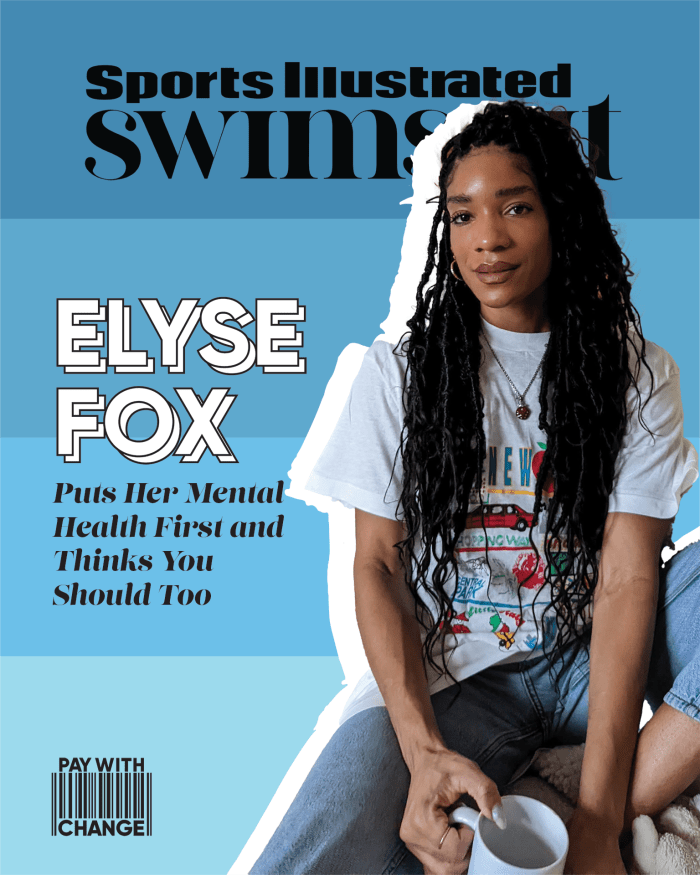Elyse Fox Is on a Mission to Make Sure All Women Feel a Little Less Sad

Before releasing her short film Conversations with Friends in 2016, Elyse Fox had no idea just how impactful those seven minutes and 30 seconds would be. “The intention wasn’t supposed to be what it was,” says the Sad Girls Club founder of how she went from being behind the camera filming celebrities and artists to being the focus of the work. “I wanted to tell the story about what I was actually going through and experiencing when I was around these crowds. I changed the narrative.”
Moving in this raw and honest direction put Fox’s depression, the departure from an abusive relationship and a suicide attempt center stage in the short film. “Immediately after I flew back to New York City after being in Los Angeles for five years, I was like, I can either go into sadness or I can create a space for myself to heal and to grow and to really get to know who I am and to really just understand why I am who I am,” she says.
The 32-year-old’s candor resonated with the audience. “At first, I didn’t want to be the face of depression or to talk about these things,” Fox admits. “But every time I opened up my mouth and said a sentence that showed a little bit of vulnerability, someone reached out and said that this impacted them in a positive way.” After the film, Fox launched Sad Girls Club, a nonprofit organization for underrepresented women.
Now what started as an Instagram page has grown into a worldwide community (one that has even caught the attention of Selena Gomez and Drake!). Fox chatted about her journey:
What made you start Sad Girls Club?
“Once I released the film, I put it on Instagram and people related to it instantly. People wanted to know more about mental health and wanted to learn more about my story, so I thought, I can either leave this where it is or create something bigger. I created Sad Girls Club from that film just to create a space, a home for people to feel seen, to share their stories, to continue to tell their stories in a way that feels authentic to them. Sad Girls Club was just a passion project and now it’s become such a great community.”
A community that just turned 5! Has what you accomplished exceeded your expectations?
“I never thought of it as a company, so us being in business for five years successfully is definitely a milestone I never dreamt of approaching. It’s been such a beautiful journey so far, though. When I started Sad Girls Club, I wanted to create a community around the topic of mental health and make the topic of mental health cool and comfortable and something that we can discuss as often as we discuss our weekends, kind of like watercooler chat.”
How has it evolved year after year?
“I’ve kept the coolness aspect, a north star for Sad Girls Club. The nonprofit world can become very stuck, and I’m a very youthful and energetic type of person. I feel like mental health deserves that same type of energy, so I have been able to partner with some really great brands like Pink, Maybelline and Nike. We’ve worked with Drake and have brought in really cool minds and groups of people to align with our thoughts and our mission. We’re meeting our community where they are and not where it’s easiest for us to be. And that comes with finding what trends are out there, how people discuss things. I’m always trying to be on the pulse of what’s cool and what’s dope and what isn’t just to make sure that everybody feels like this is just an easy point to talk about.”
You are also on the Rare Beauty mental health council. What does it mean for you and Sad Girls Club to be recognized by Selena Gomez?
“I really felt honored, for one, that she sees the work that Sad Girls Club does and understands communities like ours. They are sometimes overlooked, and she wanted to be someone who empowered communities like Sad Girls Club, to empower marginalized communities and their mental health. Everything is super collaborative. She’s a sweetie pie. To have that positivity be behind her message and her brand was like another part of it.”
How did you pivot during the pandemic, given that it had such an effect on mental well-being?
“That was a big one for us. For Black women specifically, the number of deaths by suicides have risen almost 200% in the past eight years, so the pandemic did not help that at all. We launched a program that was initially called Soul Sessions (now rebranded to Chat Room) where you can speak with coaches and mental health therapists in a group of 10 people or less from around the nation. Since 2020, we have operated over 270 hours of free talk therapy, and we’re actually expanding that this year. It was a direct response of the pandemic and people feeling isolated and not having that space to have these conversations. It’s free for our community.”
What’s next for Sad Girls Club?
“We’re actually hosting our first ever nationwide tour with a stop in London and Toronto. We will be visiting six cities across the nation and really spreading the Sad Girls Club messaging and meeting the community. Our headline sponsor is Pink by Victoria’s Secret. They were very adamant about what we’re doing and just trying to figure out ways to pour into the community. It kicks off in June, and it’s called The Summer of Sad Girls Tour.”
You have created a safe space for these types of discussions. What has been the response of women across all different backgrounds that are a part of Sad Girls Club?
“I feel like I’m one of the first people to create this space for Black women to know that you can have depression and anxiety and all of the other mental illnesses, but you can still have a normal successful life. This isn’t something that will consume you and prevent you from being the best version of yourself. Community is definitely helpful, but understand that you have all necessary tools within yourself to find help, to seek advice, to build out your community. We had a big group of women who were from the Middle East, and they’re like, ‘My family won’t even allow me to talk about these issues,’ or Asian Americans [have said], ‘We can’t even discuss these issues but knowing that you came from a Caribbean house where these issues weren’t normalized and you were able to talk about them, I feel more empowered to discuss them, too.’ There have been a lot of stories of women who are first generation like myself being the forerunners of having these conversations because I don’t want this generational curse to continue where we don’t talk about anything and we’re suffering in silence in the same home."
Depression will always be a part of you, so how do you cope with it?
“Thank you for acknowledging that because a lot of people don’t. They just think, ‘Oh, you’re fine now,’ like everything’s good, but no, it's something that I’m actively working on. I go to therapy. Whenever we have a Sad Girls Club event, I’m like, ‘This is for you guys, but I’m learning so much every time we gather and have these conversations.’ For me, it’s really about having open, honest conversations with my community helps me not bottle up the feelings that I’m feeling internally and also reach out to people who do work in the wellness space. I also take hiatuses from social media because that’s something that can be really exhausting for me. I’m always like a beacon for people to receive information and stories, and it can be really heavy at times. Sometimes I just need to unplug and just detach and just build blocks with my son for the whole weekend and not feel bad about it.”
For somebody who wants to embark on this wellness journey, what would you recommend for the first step?
“Take minor steps to build out the person that you want to be. I say write out who you want to be, where you want to be, and then set small goals or milestones to get where you want to be. Track them and celebrate them whenever you’ve reached a milestone. It’s very important for us to look back and see what we’ve done, what we've accomplished because we only look at big wins. We have to look at the small bite-size wins. We also have to hold ourselves accountable because no one else will.”
Lastly, do you have a favorite affirmation?
“My favorite one is, ‘Don’t build a life that you need a vacation from.’ And then, ‘You are enough.’ Whenever I’m feeling overwhelmed or I feel like I shouldn’t be in a certain room or in a conversation, I say ‘You are enough. You’re here for a reason,’ and that’s it.
Beginning on International Women’s Day (March 8), the Pay With Change initiative will be front and center on SI Swim channels through daily spotlights on the women, brands and properties making a concerted effort to fight for women’s equality.
